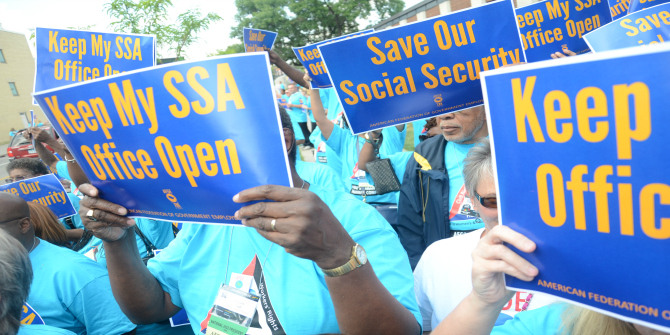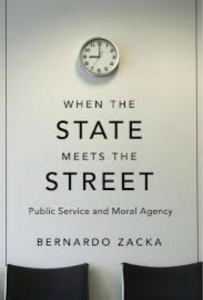In When the State Meets the Street: Public Service and Moral Agency, Bernardo Zacka draws on eight months of fieldwork working as a receptionist in an anti-poverty agency to challenge dominant understandings of the role that bureaucrats and bureaucracy play in the functioning of the state. Alex Sager praises this as a subtle and thoughtful discussion that opens up a new methodological approach for political theory.
When the State Meets the Street: Public Service and Moral Agency. Bernardo Zacka. Harvard University Press. 2017.
Bureaucracy is much maligned, simultaneously associated with deadening inefficiency, callous unaccountability and murderous tyranny. Mention of bureaucracy brings to mind K.’s futile struggle to contact the authorities in Franz Kafka’s novel The Castle or Douglas Adams’s Vogons – ‘one of the most unpleasant races in the galaxy – not actually evil, but bad-tempered, bureaucratic, officious and callous’ – who destroy Earth to make way for an interstellar freeway. On a more somber note, bureaucracy’s despotic and dehumanising tendencies are also implicated in atrocities, such as the organisation of the trains to the Nazi death camps.
Bureaucracy’s bad reputation is one-sided and does not withstand serious scrutiny. Well-designed bureaucracies are necessary to sustain many of the social goods people value most. Government, the legal system and markets – to which bureaucracy is sometimes incorrectly opposed – all depend on bureaucrats effectively implementing policies and procedures. At the same time, bureaucratic failure can leave people without healthcare or housing. Callous bureaucrats disrespect the people they serve, alienating them from the political system. The rise of the New Public Management has also led public bureaucracies to increasingly adopt private sector management techniques and practices, often with devastating consequences for the most vulnerable members of society.
Most people’s interactions with the political system are through government bureaucracies and the front-line bureaucrats who staff them. They interact with teachers, police officers and direct service providers in the Social Security office. For the majority of the public, the state’s legitimacy is conveyed through these interactions, rather than through more abstract considerations about democratic principles or rule of law. For this reason, how policies are implemented is of central importance for political theory.
Nevertheless, political theorists have devoted surprisingly little attention to how public policy is actually carried out. They mostly write about principles, laws and policies, assuming that once the what is decided, how is a matter of implementation outside their scholarly scope. When addressed at all, bureaucratic discretion is usually portrayed as a danger for democracy – what Henry Richardson has dubbed bureaucratic domination – to be constrained by explicit rules and strict hierarchies.
 Image Credit: Rally at Minneapolis Social Security Office, 2014 (AFGE CC BY 2.0)
Image Credit: Rally at Minneapolis Social Security Office, 2014 (AFGE CC BY 2.0)
In his groundbreaking book When the State Meets the Street: Public Service and Moral Agency, Bernardo Zacka illustrates a new methodological approach for political theory, opens up avenues of normative research on the neglected topic of bureaucracy and bureaucrats and overturns an intellectually dubious, but nonetheless dominant, model of the state. Zacka puts forward a bottom-up normative theory of the state and a political theory with an ‘ethnographic sensibility’ (254), drawing on eight months of ethnographic fieldwork as a receptionist at an anti-poverty agency. In doing so, he convincingly overturns the dominant view of bureaucracy in political theory: what Evelyn Brodkin calls the ‘compliance model’ of bureaucratic responsibility (36).
Under the compliance model, elected representatives set policy goals; bureaucrats then implement these, taking care not to impose their own normative judgment about their value or appropriateness. The compliance model misrepresents how bureaucracies actually function – in fact, top-level bureaucrats play a significant role in drafting legislative statutes and in interpreting them. Moreover, it is not an attractive ideal for how bureaucracies should or could function. Policies cannot dictate every possible case. Front-line bureaucrats are charged with fulfilling multiple, sometimes ambiguous or conflicting goals with limited resources. They do this under conditions of uncertainty and unpredictability. They need to exercise discretion to do their jobs and to negotiate competing considerations if they are to meet goals fairly and efficiently in a responsive and respectful manner.
This requires thinking about street-level bureaucrats as moral agents. Drawing on his fieldwork, Zacka examines the moral dispositions and perceptions of individual, street-level bureaucrats. Street-level bureaucrats have potentially conflicting obligations to be fair, respectful and responsive, as well as efficient. He proposes that bureaucrats often adopt one of three pathological types of moral dispositions: indifference, caregiving and enforcement (Chapter Two). Indifferent bureaucrats withdraw behind allegedly inflexible rules and procedures, fail to acknowledge relevant distinctions between clients and rely unduly on hierarchical directives. Caregivers devote extensive time and resources to particular clients, risking paternalism and the neglect of other clients who have equal or greater claims to services. Enforcers give more attention to particular ‘undeserving’ cases to prevent abuse, risking insensitivity to client needs. All of these dispositions are pathological because they are reductive, ignoring the inherently plural demands of bureaucratic roles.
Zacka’s solutions involve practices of the self (Chapter Three) and everyday casuistry (Chapter Four). Practices of the self are exercises that bureaucrats can use to examine their inclinations and biases to calibrate and modulate their moral perceptions, dispositions and responses. Casuistry is a form of analogic reasoning, prominent in Ancient and Medieval philosophy, that begins with particular cases rather than with abstract principles and rules. Zacka persuasively argues that the moral reasoning of case managers is achieved by comparing new cases with familiar, paradigmatic ones and noting morally salient similarities and differences. He also makes important points about how peers can provide accountability, especially when the organisational culture is hospitable to employees with diverse moral dispositions.
Zacka’s discussion is subtle and thoughtful and opens many avenues for political and moral theorists to explore. One of these areas concerns how far his observations can be generalised. Though he draws extensively on the secondary literature and briefly raises the challenges that police officers and teachers face (201-04), his fieldwork in the anti-poverty agency informs many of his positions. Would he have reached the same conclusions if he had studied street-level bureaucrats in prisons or immigration agencies, for example? This is a question for future research.
Another question and also a concern is Zacka’s focus on value pluralism, competing demands and the need for moral casuistry rather than on structural injustice. He acknowledges that public service agencies often have working conditions that undermine the moral agency of their employees (241). When this is the case, focus on the dispositions of street-level bureaucrats will only take us so far. Seemingly pathological dispositions may be rational responses to underfunded, unjust organisations. Under these conditions, the street-level bureaucrat who is able to treat the people they serve with dignity and respect for a long period of time is somebody we should admire, but not expect most other people to emulate. The pressing moral question then becomes one of institutional and societal reform, not moral psychology.
There is also a curious lacuna in When the State Meets the Street: Zacka tells us much about how street-level bureaucrats make decisions, but says fairly little about the people they serve. This suggests that bureaucratic justice is largely about the moral agency of frontline workers negotiating competing values to carry out their task. What it leaves out is the agency and the voice of people who rely on these bureaucracies and the mechanisms available for them to hold agencies accountable. Frontline services invariably involve at the very least a street-level bureaucrat and a client, so attention to these interactions and the institutional context in which they occur is an important future task for ethnographically-oriented political theorists.
- This review originally appeared at the LSE Review of Books.
Please read our comments policy before commenting.
Note: This article gives the views of the authors, and not the position of USAPP– American Politics and Policy, nor of the London School of Economics.
Shortened URL for this post: http://bit.ly/2Hzr5no
About the reviewer
Alex Sager – Portland State University
Alex Sager is Chair of the Philosophy Department at Portland State University. His monograph Toward a Cosmopolitan Ethics of Mobility: The Migrant’s-Eye View of the World (Palgrave) appeared in January 2018. Follow him on Twitter: @aesager. Read more by Alex Sager.


 Find this book:
Find this book: 



